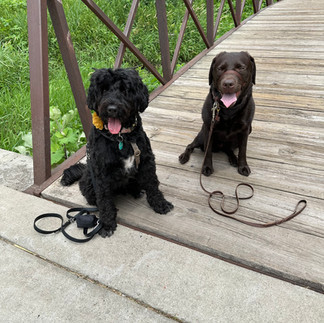How to Find a Gluten Detection Service Dog Trainer
- Kendra Williams

- Aug 2, 2023
- 3 min read
Updated: Oct 9, 2024
Are you interested in training a gluten detection service dog? The journey to finding the right gluten detection service dog trainer can be a challenging one, especially considering the high demand for such specialized training. Many individuals have shared unfortunate stories of investing in dogs from trainers, only to find that these dogs couldn't successfully complete the required tasks. To avoid such disappointments and financial losses, thorough research and asking the right questions upfront are crucial.
Asking the Right Questions
When embarking on the journey to find a gluten detection service dog trainer, it's essential to start by asking pertinent questions that can guide your decision-making process.
Training and Education: Inquire about the trainer's background, training, and education. Have they undergone training with another professional trainer or a reputable training organization? Do they possess specialized training in gluten or allergen detection? This specialized knowledge is vital, as training a gluten detection dog requires specific expertise. While you might have experience in gluten detection, having a trained dog trainer can be indispensable for troubleshooting training challenges and adapting to individual dog and handler needs. It's important to ensure the trainer has the necessary credentials and training titles.
Experience with Working Dogs: Determine the number of dogs the trainer has successfully trained and that are currently working. The practical experience of the trainer in producing working dogs is a testament to their skills and methodologies.
Real-Life Training Sessions: Request to see an unedited video of the trainer working with a dog in a real-life situation. This video should showcase the trainer's interaction, the dog's body language, and behavior throughout the training session. A comprehensive video will provide insights into the trainer's training techniques and the dog's response.
References: Ask the trainer for references, both from training organizations and handlers of dogs they have trained. When contacting references, inquire about their training experience, challenges they encountered, and the ongoing work required even after the dog's graduation. Understand that training is an ongoing process beyond graduation.
Training Methods: Inquire about the training methods used. Positive reinforcement is pivotal in gluten detection and all dog training. It's important to confirm that aversive tools like prong collars, electric shock collars (e collars), or choke collars are not used. Scientific research supports the effectiveness of positive reinforcement in building strong bonds and desired behaviors. The American Veterinary Society of Animal Behavior recommends that shock, prong and choke collars not be used. Download their position statement here.
Diverse Experience: Ask about the range of dogs the trainer has worked with. This will help you understand if this is truly a professional trainer with experience with many different dogs. A higher number indicates a more seasoned and adaptable trainer. Extensive experience with various dogs is a testament to a professional's skills, especially if they have interned under experienced trainers for substantial hours.
Compatibility: Just as with personal trainers or life coaches, your compatibility with the dog trainer is crucial. Assess whether their communication and teaching style align with your preferences. A trainer who provides positive encouragement and constructive feedback fosters a better learning environment. Also, inquire about the type of training instruction they offer and whether they provide updates or homework after each lesson.
Certifications and Tests: If you're considering acquiring a program dog or one trained by another trainer, ensure that the dog can pass the required tests set by ODOR Service Dogs. This organization sets standards for allergen and scent detection service dogs. The dog should pass the OGAD Gluten/Allergen Detection Title and the OPAT Public Access Title. You can see all the required titles and download the requirements here. It's essential to note that puppies under 1 year old lack the maturity to be fully trained service dogs. Organizations selling such puppies are not providing fully trained service dogs.
Trust Your Instincts
Above all else, trust your instincts. This decision involves a significant commitment of time, money, and adding a new family member. Don't hesitate to make a change if things aren't working out as planned. It is very important that your questions are answered and that you find the right fit for you and your dog.
Additional Resources
For further guidance on finding the right dog trainer, consider checking out the American Kennel Club's advice on choosing a dog trainer. Additionally, you can learn more about the standards set by ODOR Service Dogs by visiting their website: www.odorservicedogs.com.











Comments